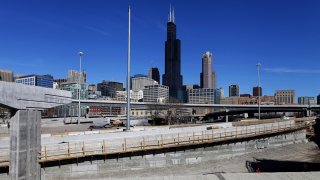
A strike, now almost a month old, against three construction material producers is snagging road projects in the Chicago area and could force some to be canceled.
Local 150 of the International Union of Operating Engineers has been on strike since June 7 against companies the union said operate 35 quarries and other locations across Northern Illinois.
Lehigh Hanson, Vulcan Materials and Lafarge Holcim produce sand, gravel and crushed stone needed for asphalt and concrete. About 300 workers are involved in the walkout.
Ed Maher, communications director for Local 150, said asphalt has become nearly impossible for road crews to get and that problems with concrete supplies are growing. He said the companies have agreed to no talks since a brief session Wednesday.
"We have made ourselves available every day," Maher said. "We recognize the impact this strike is having on the construction industry, and that’s why we want to bargain and get this settled."
The companies negotiate as members of the Chicago Area Aggregate Producers Association. A spokesperson for the group could not be reached.
Omer Osman, secretary of the Illinois Department of Transportation, urged the three companies in a letter Thursday to settle the strike.
Local
Osman said the strike is lengthening projects such as the Jane Byrne Interchange downtown, the Interstate 55 and Weber Road interchange and the Interstate 80 bridge in Joliet. Numerous resurfacing projects in the Chicago area also are affected, he said.
“The work stoppage could not occur at a worse time, at the height of construction season and during peak driving season with an eager public ready to travel after two years of a pandemic,” Osman wrote.
Feeling out of the loop? We'll catch you up on the Chicago news you need to know. Sign up for the weekly Chicago Catch-Up newsletter.
He said contracts approved in June might need to be suspended and that those scheduled in July could be deferred.
Maria Castaneda, an IDOT spokesperson, said some road crews have made do by changing schedules and working through stockpiles but that the problems are compounding. Castaneda said most of the agency’s roadwork is affected, though some projects in Northern Illinois use material from Indiana and Wisconsin.
Erica Schroeder of the city of Chicago Department of Transportation said that agency has "been able to work through stockpiles, but every day the strike gets more detrimental."
Local 150 member Jamal Chester said his employer in McCook, Vulcan, has used supervisors to try to handle some equipment and that the other two companies have tried strikebreakers. He said the companies have been slow to negotiate.
“I guess they really didn’t think we would stand by our word,” Chester said.
Maher said disputed matters that need to be settled include wages, benefits and grievance procedures. The union has filed several complaints with the National Labor Relations Board, accusing the companies of unfair labor practices.
He said leaders of Local 150 have been frustrated that the companies’ negotiators apparently lack decision-making authority. Two of the three companies are based overseas, according to their websites.
Maher said the union was grateful that U.S. Sen. Bernie Sanders, I-Vermont, voiced his support for the strike Friday.
"These billion-dollar companies have seen SKYROCKETING profits," Sanders tweeted. "YES — they can afford to treat workers with respect and to bargain in good faith."



